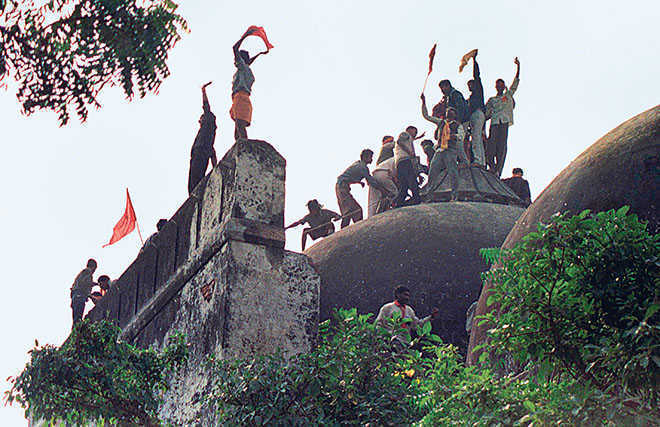
Senior advocate CS Vaidyanathan, appearing for deity Ram Lalla Virajman, advanced arguments before a five-judge constitution bench headed by Chief Justice Ranjan Gogoi. File photo
New Delhi, August 14
It is the “belief and faith” of Hindus that Ayodhya is the birthplace of Lord Ram and he was born at the site of the disputed structure, ‘Ram Lalla Virajman’ told the Supreme Court on Wednesday.
The counsel appearing for ‘Ram Lalla Virajman’ told a five-judge Constitution bench headed by Chief Justice Ranjan Gogoi that according to Hindu ‘puranas’ it is the belief of Hindus that Lord Ram was born in Ayodhya and the court should not go beyond to see how rational it is.
Advancing the arguments on the sixth day of the hearing, senior advocate CS Vaidyanathan, appearing for the deity, referred to the travelogue written by English merchant William Finch, who had visited India from 1608-1611, and recorded that there was a fort or castle in Ayodhya where Hindus believed Lord Ram was born.
“It is the faith of people that it is the place where Lord Ram was born,” he told the bench, also comprising Justices SA Bobde, DY Chandrachud, Ashok Bhushan and SA Nazeer.
“It is always considered to be the birthplace of Lord Ram,” Vaidyanathan said.
Finch’s travelogue, published in the book ‘Early Travels to India’, has mentioned that Hindus believed Ayodhya was birthplace of Lord Ram, he said.
He also referred to other travelogues, including those by British surveyor Montgomery Martin and Jesuit missionary Joseph Tiefenthaler, to buttress his arguments about faith of people that Ayodhya was the birthplace of Lord Ram.
During the arguments, the bench asked Vaidyanathan, “When it was first called Babri Masjid?”.
Responding to the query, the senior counsel said, “In the 19th century. There is no document available to show that earlier (prior to 19th century) it was known as Babri Masjid.”
To this, the bench asked, “Is the ‘Baburnama’ (memoirs of Mughal ruler Babur) totally silent on this?”
When Vaidyanathan said that ‘Baburnama’ is silent on this, the bench said, “What is the objective evidence available that Babur directed for its (temple) demolition?”
To this, the senior counsel said Babur had asked his general to demolish the structure.
Senior advocate Rajeev Dhavan, appearing for a Muslim party, objected to Vaidyanathan’s submission about ‘Baburnama’ being silent about Babur’s visit to Ayodhya.
Dhavan said ‘Baburnama’ mentioned Babur crossing the river to Ayodhya and some of its pages are missing.
During the arguments, Vaidyanathan said that there were two versions--one about demolition of the temple by Babur and other about its demolition by Mughal ruler Aurangzeb--but the inscription in the mosque suggested that Babur constructed the three-dome structure at the disputed site.
“It is clear that the structure (temple) was there,” he told the bench, adding, “This (masjid) construction has come up at a place which is believed by the Hindus to be the ‘Janmasthan’.”
At the outset, Vaidyanathan said he would first deal with documentary evidence and then come to oral evidence in the case, followed by evidences of Archeological Surveys there.
The arguments in the case would continue in the post-lunch session.
The counsel representing ‘Ram Lalla Virajman’ had told the apex court on Tuesday that the birth place of Lord Ram is also a deity and the Muslims could not claim right over the 2.77-acre disputed land in Ayodhya as any division of property would amount to “destruction” and “mutilation” of the deity itself.
Fourteen appeals have been filed in the apex court against the 2010 Allahabad High Court judgment, delivered in four civil suits, that the 2.77-acre land in Ayodhya be partitioned equally among the three parties--the Sunni Waqf Board, the Nirmohi Akhara and Ram Lalla. PTI



























